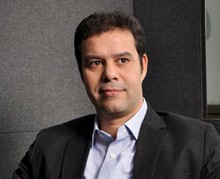This post is part of our series Say Hello To China’s Expat-preneurs, where we will talk to a mix of foreign founders and tech veterans who have tackled China’s growing tech space and won. Stay tuned over the coming three weeks as we talk to foreign founders from Beijing to Shenzhen about what it takes to thrive in China. You can follow our updates at @technodechina, or check back here for new stories in the series.
It’s hard enough for a serial entrepreneur to build two successful startups in a row, but, as you can imagine, the challenge will become even greater when those companies are developing products for two completely different markets. However, Soul Htite, the co-founder of Lending Club and founder/CEO of Dianrong, managed to find the secret recipe for achieving this goal.
After co-founding Lending Club and acting as the company’s head of technology for four years, Soul founded Shanghai-based P2P lending platform Dianrong in 2013 in an attempt to recreate the success of Lending Club in China.
Given Soul’s relationship with Lending Club, it is easy to imagine that Dianrong is similar to the U.S. online loan broker and its followers have nicknamed Dianrong the “Lending Club of China.” But Soul explained that Dianrong is different from Lending Club in several ways since it targets users with different investment habits and cultures.
“Lending Club focuses on one type of loaning product, but Dianrong has developed a series of products to cater for the different needs of local users. Chinese investors tend to take less investment risks and prefer automatic investment solutions, and that’s why Dianrong developed Tuantuanzhuan, a technology to lower risks automatically by spreading out investments,” said Soul.
In addition, Dianrong has teamed up with local partners like car service Yihao Zhuanche and Alibaba’s credit rating system Sesame Credit to try out cross-industry cooperation opportunities. “Just like the “Internet Plus” strategy everyone is talking about in China, we are trying to develop more innovative technology and find an internet-based way of thinking. The cooperation with Sesame Credit is one step further in exploring possibilities for big data risk control. Our core competitiveness as an internet financial company is the capacity to run risk control by leveraging all kinds of data collected from the internet. In the case of Sesame Credit, we are now including their data into our risk assessment model under different scenarios.”

China’s P2P lending industry, a hot vertical in the country’s fintech trends, is gradually transforming the country’s banking industry as well as how Chinese people manage their assets, but there are still many challenges ahead, especially in terms of regulation.
According to Soul, Lending Club had a similar experience in coping with the formation and development of U.S. P2P regulation system, and their respect for governmental monitoring has allowed the company to outgrown other competitors.
Likewise, Dianrong is willing to be a part of the budding P2P lending regulation system in China, Soul said, adding that the company is contributing to the draft of a P2P monitoring whitebook compiled by relevant authorities.
Entrepreneurial Environment of China and Shanghai
Soul started his career as a tech guy. He confessed that he prefers creating innovative products that can change people’s lives to managing a company. “In matured markets like U.S., the only thing startups can do is to provide a better lending product. But we might offer the very first loan experience to users in emerging markets like China, where new technologies may bring bigger impacts.”
For Soul, China provides a favorable environment for entrepreneurship with improving legislative system, wide internet penetration and great talents. “In fact, I have compared the startup environment of Shanghai, Beijing and Shenzhen when first came to China. I finally chose Shanghai because the city is more international and offers more financial talents.”
<Quick Questions>
Advice for foreign startups looking to enter Chinese market.
Firstly, your product must solve some problems for local users. Secondly, always respect the regulations. My experience is to find the most excellent people to work with you cause talents are the biggest fortune of your company.
What’s the most striking cultural difference that shocked you when you first came to China?
In terms of what I am doing now, people loan money for consumption in the U.S., but Chinese people borrow money for doing business or receiving a better education. I think this difference best demonstrate the cultural difference of the two countries.
What do you love about China?
I love a lot of things in China both in terms of entrepreneurial environment and living here. I love Chinese food and steamed buns are my favorite.
What is your personal motto in your life?
Best or nothing.

